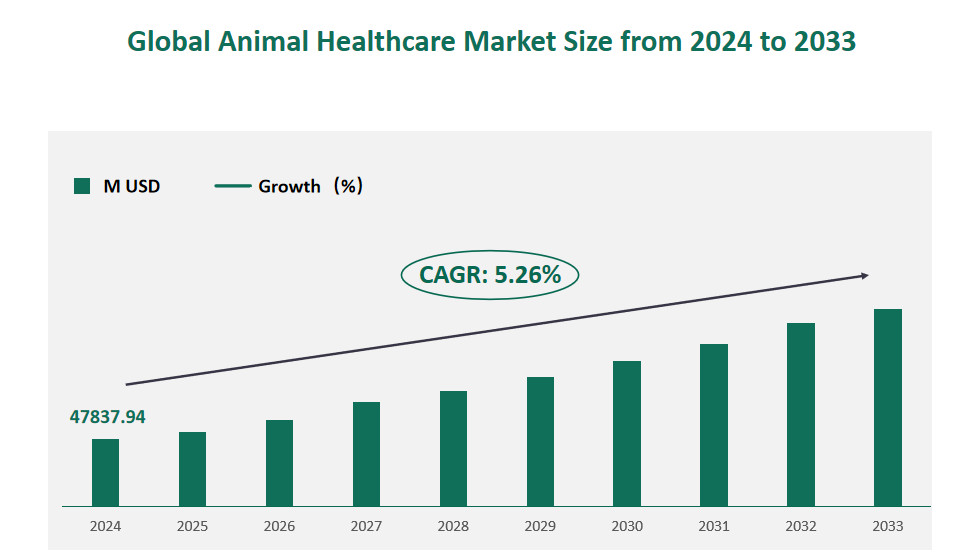1 Global Animal Healthcare Market Size (Value) and CAGR (2024-2033)
In 2024, the global Animal Healthcare market was valued at USD 47837.94 million, with a CAGR of 5.26% from 2024 to 2033.
Animal Health is a concept in Agricultural Science that ensures farm animals are healthy, free from diseases and well catered for. Animal health is very important because healthy animals make the world a better place. Animals play significant roles in the lives of people and communities through being livestock for food production and pets for companionship.
Figure Global Animal Healthcare Market Size (M USD) and CAGR 2024-2033

2 Animal Healthcare Market Drivers
Increasing Pet Ownership and Humanization
One of the most significant drivers of the Animal Healthcare market is the growing trend of pet ownership and the humanization of pets. In many developed countries, pets are increasingly being treated as family members, leading to higher spending on their health and well-being. This trend is not limited to traditional pets like dogs and cats; it also extends to exotic animals and birds. The humanization of pets has led to increased demand for advanced veterinary care, specialized medications, and preventive treatments such as vaccinations and parasiticides. This trend is particularly pronounced in North America and Europe, where pet owners are willing to spend significantly on ensuring their pets’ health.
Advancements in Veterinary Medicine
Advancements in veterinary medicine have also played a crucial role in driving the Animal Healthcare market. The development of new and improved pharmaceuticals, vaccines, and diagnostic tools has made it possible to treat a wide range of animal diseases more effectively. For instance, the introduction of advanced vaccines has significantly reduced the incidence of infectious diseases in livestock and companion animals.
Growing Awareness of Animal Welfare
There is a growing global awareness of animal welfare issues, driven by both ethical considerations and the recognition of the economic importance of healthy animals. Governments and non-governmental organizations are increasingly promoting policies and regulations aimed at improving animal health and welfare. This includes initiatives to control the spread of zoonotic diseases, which can have significant public health implications.
3 Animal Healthcare Market Restraints
Regulatory Challenges
One of the primary limitations faced by the Animal Healthcare market is the complex regulatory environment. Governments around the world have implemented stringent regulations to ensure the safety and efficacy of animal healthcare products. While these regulations are essential for protecting animal and public health, they can also create significant barriers for companies looking to introduce new products. The approval process for veterinary drugs and vaccines is often lengthy and expensive, requiring extensive testing and documentation. This can delay the introduction of new products and limit the market’s ability to respond quickly to emerging health threats.
Economic Factors
Economic factors also pose significant challenges to the Animal Healthcare market. The cost of veterinary care and animal healthcare products can be prohibitive for many pet owners and livestock farmers, particularly in developing countries. High costs can limit access to essential healthcare services, leading to untreated diseases and lower productivity in livestock.
4 Global Animal Healthcare Market Size by Type in 2024
Pharmaceuticals represent a significant portion of the Animal Healthcare market, with a projected value of 12,016.16 million USD in 2024. These products include a wide range of medications designed to treat or prevent diseases and infections in animals. Pharmaceuticals encompass various categories such as anti-parasitic drugs, anti-inflammatory medications, anesthetics, pain medications, antibiotics, and specialized products for managing reproductive, cardiovascular, or metabolic conditions. The demand for pharmaceuticals is driven by the increasing prevalence of chronic diseases in animals, the need for effective treatments, and the growing awareness of pet owners and livestock farmers about the importance of veterinary care.
Feed Additives constitute another major segment of the Animal Healthcare market, with a projected value of 21,713.64 million USD in 2024. These products are essential for improving the nutritional value of animal feed, enhancing animal health, and promoting better performance. Feed additives include vitamins, minerals, amino acids, probiotics, and other substances that support overall animal health and productivity. The use of feed additives is particularly important in livestock farming, where they help improve feed efficiency, reduce the incidence of diseases, and enhance the quality of animal products.
Vaccines are a critical component of preventive healthcare for animals, with a projected market value of 7,979.37 million USD in 2024. Vaccines are used to protect animals from a wide range of infectious diseases, thereby reducing the incidence of illness and mortality. They play a vital role in controlling the spread of zoonotic diseases, which can have significant public health implications. Vaccines are administered to both companion animals and livestock, with common examples including rabies, distemper, parvovirus, and various respiratory and gastrointestinal diseases.
Table Global Animal Healthcare Market Size by Type in 2024
Application | Market Size (M USD) 2024 |
Pharmaceutical | 12016.16 |
Feed Additives | 21713.64 |
Vaccines | 7979.37 |
Others | 6128.77 |
5 Global Animal Healthcare Market Size by Application in 2024
In 2024, the Companion Animals segment is projected to reach a market value of 17,877.04 million USD, while the Farm Animals segment is expected to achieve a market value of 29,960.90 million USD. These figures reflect the diverse needs and growth drivers within the animal healthcare sector.
The Companion Animals segment encompasses pets such as dogs, cats, and other small animals kept primarily for companionship. This segment is driven by the increasing humanization of pets, where pet owners are willing to invest significantly in their pets’ health and well-being. The market for companion animal healthcare includes a wide range of products and services, from veterinary pharmaceuticals and vaccines to nutritional supplements and advanced diagnostic services. The demand for these products is particularly high in developed regions such as North America and Europe, where pet ownership is widespread and pet owners have higher disposable incomes.
On the other hand, the Farm Animals segment includes livestock such as cattle, pigs, poultry, and other animals raised for food production. The health of farm animals is crucial for ensuring food security and meeting the growing global demand for animal protein. This segment is characterized by a high demand for veterinary pharmaceuticals, feed additives, and vaccines to maintain the health and productivity of livestock. The market for farm animal healthcare is driven by the need to control zoonotic diseases, improve feed efficiency, and ensure the overall well-being of animals in agricultural settings.
Table Global Animal Healthcare Market Size by Application in 2024
Application | Market Size (M USD) 2024 |
Farm Animals | 29960.90 |
Companion Animals | 17877.04 |
6 Global Animal Healthcare Market Sales by Region in 2024
North America, with a projected market value of 15675.83 million USD in 2024, remains the largest market for animal healthcare. This region benefits from advanced veterinary infrastructures, high disposable incomes, and a strong focus on preventive healthcare. The United States and Canada lead in the adoption of advanced veterinary technologies and services, contributing to the region’s dominant position in the global market.
Europe follows closely with a projected market value of 13823.35 million USD in 2024. European countries such as Germany, France, and the United Kingdom have well-established veterinary healthcare systems and high demand for quality animal healthcare products. The European market is characterized by strong regulatory frameworks, a focus on animal welfare, and a growing trend towards sustainable farming practices. The demand for animal healthcare in Europe is driven by the need to control zoonotic diseases and ensure food safety, making it a significant contributor to the global market.
China is a rapidly growing market for animal healthcare, with a projected value of 5968.88 million USD in 2024. The market in China is driven by increasing pet ownership, particularly in urban areas, and the expansion of livestock farming to meet the growing demand for meat and dairy products.
Figure Global Animal Healthcare Market Size by Region in 2024

7 Major Players in Global Animal Healthcare Market
7.1 Zoetis
Company Profile: Zoetis, established in 1952, is a global leader in the discovery, development, manufacture, and marketing of veterinary vaccines and medicines. The company operates worldwide and is headquartered in Parsippany, New Jersey, USA. Zoetis is committed to improving the lives of animals through innovative healthcare solutions.
Business Overview: Zoetis offers a comprehensive range of products for both companion and farm animals. Their portfolio includes vaccines, parasiticides, anti-infectives, medicinal feed additives, and other pharmaceuticals designed to enhance animal health and well-being. Zoetis’ products are used to treat and prevent various diseases, ensuring the health of pets and livestock alike.
Service Introduction: Zoetis provides veterinarians with the resources needed to offer high-quality care to companion animals, helping to extend their lifespan and improve their quality of life. For farm animals, Zoetis offers solutions that address the challenges faced by livestock producers, including products that prevent and treat diseases, improve feed efficiency, and enhance overall animal health.
Recent Financial Performance: In the most recent year, Zoetis reported a revenue of 5,622.70 million USD.
7.2 Nutreco N.V.
Company Profile: Nutreco N.V., established in 1994, is a global leader in animal nutrition and aquaculture feed. The company is headquartered in Amersfoort, Netherlands, and operates through three main segments: Animal Nutrition, Fish Feed, and Compound Feed & Meat Iberia.
Business Overview: Nutreco N.V. specializes in the production and sale of nutritional products for poultry, pigs, ruminants, companion animals, and fish. Their products are designed to meet the specific nutritional needs of various animal species, ensuring optimal health and performance. Nutreco’s commitment to innovation and sustainability is evident in their product offerings and business practices.
Service Introduction: Nutreco N.V. offers a wide range of feed specialties, premixes, and nutritional services tailored to the needs of the animal nutrition industry. Their products include Skretting aquaculture feeds, which are designed to achieve optimal nutritional value and sustainable production, and Trouw Nutrition’s innovative feed concepts and nutritional solutions for livestock.
Recent Financial Performance: In the most recent year, Nutreco N.V. reported a revenue of 5,519.18 million USD.
7.3 Cargill
Company Profile: Cargill, established in 1865, is a multinational corporation that specializes in the production and marketing of animal feeds and customized animal productivity solutions. The company is headquartered in Minnetonka, Minnesota, USA, and operates globally.
Business Overview: Cargill Animal Nutrition develops and markets a range of animal feeds and customized solutions for commercial producers in North and South America, Europe, and Asia. Their products include inputs, vitamins, minerals, and additives designed to improve animal health and productivity.
Service Introduction: Cargill offers a variety of products and services aimed at enhancing animal health and performance. Their portfolio includes Diamond V® microbial fermentation products, EWOS® aquaculture feeds, Nutrena® animal nutrition solutions, and Provimi® feed solutions. These products are backed by extensive research and development efforts, ensuring high-quality and effective solutions for animal health.
Recent Financial Performance: In the most recent year, Cargill reported a revenue of 4,926.19 million USD.

